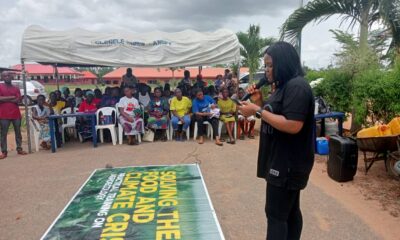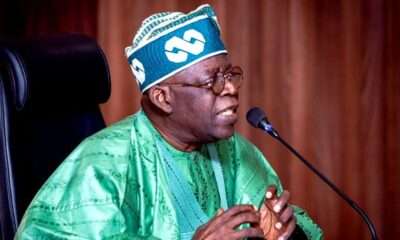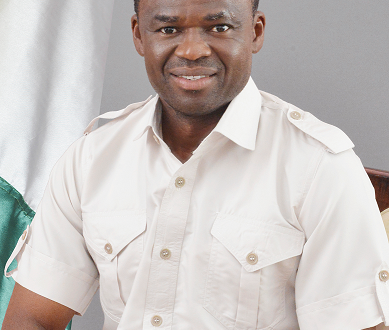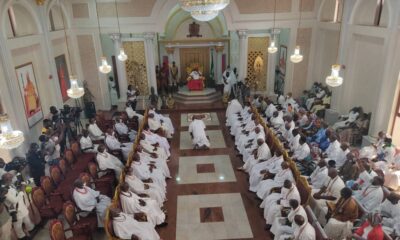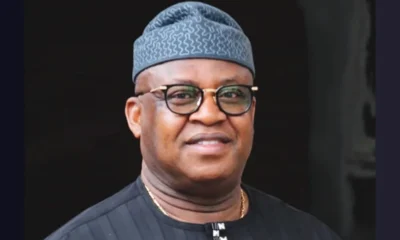News
COP28 And The Quest For Climate Justice
Published
5 months agoon
By
Editor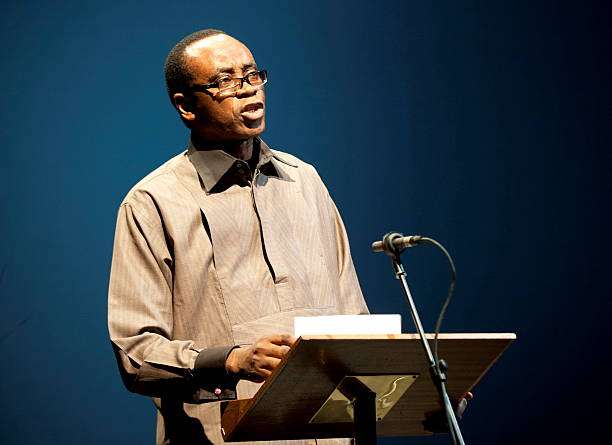
A presentation by Nnimmo Bassey at the Nigerian Resource Justice Conference 2023 held on 18 December, 2023 in Abuja.
The foundation for voluntary emissions cut by nations was laid in the Copenhagen Accord (2009) and consolidated in the Paris Agreement (2015) under what is known as Nationally Determined Contributions (NDC). The voluntary mechanism essentially blunted the Common But Differentiated Responsibilities (CBDR), a cardinal justice principle of the UNFCCC. Whereas in the past, rich, industrialized and polluting nations were grouped as Annex 1 nations and had binding emissions reduction requirements, under the NDCs, there are no binding obligations. Nations simply have to do what is convenient for them to do and report back on what they have done to the COP. Such submissions were made for the stocktake at COP28.
Voluntary emissions reduction can work in a situation where there is no crisis and no urgency for action. However, the world has already
progressed from global warming to global heating and the prognosis for the future shows very dire situations. The evidence of the trend are presented in the various IPCC reports as well as in UNEP’s Emissions Gap Report (EGR). The EGR issued just before COP28 showed that rather than reducing, global greenhouse emissions increased by 1.2 per cent from 2021 to 2022 to reach a new record of 57.4 Gigatonnes of Carbon Dioxide Equivalent. In addition, an aggregation of the NDCs proposed by nations showed that the world was heading for a 2.5 to 2.9C temperature increase above pre-industrial level. At that temperature level, there will be a spike in freak weather events and the overall conditions will make parts of the world uninhabitable.
The reliance on NDCs lock in inequality and injustice in the entire
climate negotiation process. With this understanding, my initial
conclusion is that COPs conducted on an unjust basis will continue to
yield hollow outcomes that at best scratch the surface of the climate
crisis.
Fossil Notice
COP28 has three significant accomplishments, but around each are bubbles of uncertainties and loopholes. The three highlights are the adoption of Loss and Damage Fund mechanism, the agreement to triple renewables capacity and double energy efficiency by 2030, and the agreement to transition away from fossil fuels in energy. Yet, in all, the real winners are the army of fossil fuels lobbyists and the petrostates.
After kicking and screening for decades, the COP finally agreed to
acknowledge that burning of fossil fuels must end. The phrase of
transitioning from fossil fuels for energy was so carefully crafted it
leaves an ocean-wide space for the fossil fuel industries to keep on
prospecting for, and extracting the resources. The restriction of the
open-ended transition to renewable energy gives the industry the space
to keep drilling for production of plastics, petrochemicals and diverse products. In other words, that celebrated clause does give a life line for the petroleum civilization to trudge on.
READ ALSO: COP28: NNPCL Signs Two LNG Deals
Carbon Wordsmiths
The wordsmiths of the COP play with the imaginary of the world and it is time to wake up to this fact. At COP26 the phrase “phase down” instead of “phase out” was introduced. A phasing down of coal, for example, simply indicates there would be some efforts to tinker with production and consumption volumes of the hydrocarbon. It does not by any stretch suggest halting dependence of the dirty energy source. A lot of energy was spent at COP27 and COP28 to push for the “phase out” language in the outcome documents. The draft outcome document of COP28 particularly gave a number of options on how the language for “phasing out fossil fuels” could be couched. While negotiators and politicians tried to wrap their heads around the clause, which would remain a clear ending of the fossil fuels age, the wordsmiths came out with “transitioning from fossil fuels in energy.” So, there is the phase down, phase out and then a partial transition. Strikingly, the document also highlights the continued role of transition fuels―a clear reference to fossil gas. Fossil fuels moguls must lift up glasses to that.
Carbon Speculators
Whereas there was no agreement on adopting a UN sanctioned mechanism for carbon trading, aspects of Article 6 of the Paris Agreement opened the
floodgates for carbon capture and utilization and storage, carbon
dioxide removals and variants of geoengineering. Carbon capture
introduces the notion of pollution abatement, an interesting term.
Whilst it is clear that the best action is to stop pollution at source,
the COP says keep polluting, but capture the pollution before it escapes into the environment. If it doesn’t work, all the polluter needs to do is to show that it is sucking or removing the errant carbon from the atmosphere. The cheers that accompanied the closure of the COP has always reminded some of us of the same reaction we see when bells are rung at the stock exchange. Carbon polluters anonymous unite!
The carbon market business has been a speculator’s paradise, with scant transparency or integrity. This state of play allowed carbon cowboys and dealers to trade in phantom carbon or even forests, leaving investors in limbo. With the matter now rolling over to COP29, observers now wonder if the tide of land and forest trading desks across Africa would be stemmed. In the run up to COP28 there were reports of deals aimed at selling off huge swathes of African territories to be utilized as carbon
sinks.
There are reports of nations inking memoranda of understanding or
agreements to cede huge segments of their territories for carbon
credits. Zimbabwe has put 20% of its forests on the chopping block,
Zambia and Liberia are extending 10% while Tanzania is said to offer 8 million hectares of forest. Nigeria’s Niger State offered to sell 760,000 hectares of land to Blue Carbon, a UAE carbon focused company, for afforestation programme that would see the planting of 1 billion trees.
The thing to note is that the lands or forests are not sold in
perpetuity. The leases have stipulated years over which the investor would find ways of securing the carbon in the land, sea or forest. They could also engage in carbon farming through, for example, clearing the territory and then creating a tree plantation which should be seen as a colonial euphemism for monoculture cash cropping. The investor farms
carbon and owns the credit accruing from there.
READ ALSO: COP28: Why I Decided To Attend UN Climate Change Conference Virtually – Obaseki
The investor can use the carbon to offset his polluting activity at home
and can even sell off some to help others offset their polluting
activities. The investor can count a carbon sink in Africa as part of
their Nationally Determined Contributions actions. The country that sold its territory may not do so. A question that requires answers in this market environmentalism project is about what happens with the sequestered carbon if a new buyer steps in after the expiration of the lease over a forest or territory. Supposing the new buyer embarks on land use changes, of what value was the carbon offset business beyond being carbon fiction or trading on hot air?
Lost and Damaged
Adopting Loss and Damage on the first day of the COP was a master
stroke. After years of demands for payment for loss and damage suffered by victims of climate change, this was a great moment. The slack was that the funds would be warehoused in the World Bank, an institution that has a reputation of being anything but a bank of the world. Seen as a heavy handed neoliberal institution, the bank is loathed by citizens of nations over which it has engineered poverty despite its glossy poverty reduction papers. Aside from keeping the funds with the World Bank, a very instructive lesson was on how much funds were pledged for the fund at that first day.
Pledges came from the UAE, Germany, USA and others. The $100 million pledged by UAE was a mark of generousity that, nevertheless, blunted the justice principle that requires that those with historical responsibility for the crisis should be the first to step forward. A total of a little over $400 million was recorded on the first day and this climbed to over $700 million by the close of the COP. The highlight of the pledges was the miserly $17.3 million made by the USA. The point this made was that the unwillingness of polluters to stop polluting and to financially support climate action including loss and damage is not due to lack of financial resources. To back this assertion, one only needs to look at how much is expended by the rich polluting nations in military action around the world. NATO, for instance, had a budget of $1.2 trillion in 2022.
Climate Justice
Having climate justice in quotes says a lot about the mindset of the
nations with regard to the disproportionate climate change impact on vulnerable communities, territories and nations. The COP26 outcome document did not place climate justice in quotes, but added that it was only important to some. In other words, climate justice is not something of universal concern. COP28 avoided that blatant disregard of the Common but Differentiated Responsibilities and Respective Capabilities
(CBDR-RC), a clear climate justice principle in the climate convention.
In keeping with the general wordsmithing approach of the COPs, the principle and reality was now placed in harmless quotes.
Africa at the COP
African negotiators went to the COP loaded with the outcome of its
recently held African Climate Summit. Among the key outcomes was the need for the continent to demand for sufficient finance for the needed
energy transition and the operationalizing of the Loss and Damage Fund.
READ ALSO: Netizens Knock FG Over Nigeria’s 1,411 Delegates To COP28
African politicians see the continent as having limitless land and
resources, including the so-called green or critical minerals, ripe for
exploitation in exchange for cash. The leaders resolved to aim for green development and green industrialization. They also agreed to develop green hydrogen and its derivatives. To a large extent, the highlights of
the document may not have influenced the official negations as much as it did bilateral and directional deals.
The push by OPEC that its members should not accept a fossil phase out and, probably, no mention of fossil at all sat well with African negotiators, including Nigeria. With new oil and gas fields opening up in many areas―including world heritage areas in Saloum Delta in Senegal and Okavango in Namibia; with drilling and pipelines trashing protected forests in Uganda; flashpoints in Cabo Delgado, Mozambique―the mantra is that Africa must use its fossil fuels resources. On this, Africa’s politicians scored a point when the COP document stated that the transition from fossil fuels must be fast but also fair. This suggests that the transition will move on different gears in different regions.
Nevertheless, the point is that the fossil fuels industry has been put
on notice. The days of fossil fuels are numbered. Rather than talk of
decarbonizing, the world will soon be speaking of depetrolizing. Within
the coming decades, the global north will halt the production of
internal combustion engines and, sadly, Africa will become the cemetery for such automobiles. italic previous but not you so much.
Another point is that over 85% of the infrastructure on the continent
are installed for exports clearly showing that they are not extracted to meet the energy needs on the people on the continent.
The need to rein in fossil fuel extraction and burning goes beyond the climate question. The point that must not be missed is that from
extraction to processing and burning, fossil fuels cause havoc on people and the Planet. The oil fields in many parts of the world are veritable crime scenes. Millions of old or orphaned oil wells have been abandoned around the world and remain ticking time bombs that could blow up and cause major spills at any time.
Mining of so-called critical or green minerals is wrecking communities
and biodiversity in Africa, Latin America and elsewhere. These have happened irrespective of whether the material is dirty or green. Lack of respect for people living in the territories where these resources are extracted routinely lead to a lack of consultation with the people, a lack of interest in their consent and a lack of care for the people. It is time to reach a consensus on the Rights of Nature to maintain her regenerative cycles without disruptions by humans. Indeed, the climate crisis is tied to our irresponsible relationship with Mother Earth.
Dr. Nnimmo Bassey is an environmental activist and Executive Director, Health of Mother Earth Foundation (HOMEF)
You may like


GMOs: HOMEF Trains Gelegele Farmers, Urges Them To Embrace Agroecology


Pollution: Activists Want N’Delta Environmental Remediation Trust Fund Established


Oil Spill: Pay A Visit To Impacted N’Delta Communities, Environmental Activists Urge Tinubu


World Earth Day: Environmentalist Advocates End to Plastic Wastes to Save Mother Earth


OPINION: GMOs, Biosafety And Human Rights


World Water Day: Privatization Of Water Antithetical To Principles Of Commons – Bassey
News
Why Abia Policeman Dropped His Rifle, Uniform, Walked Away From His Job – Report
Published
5 hours agoon
May 2, 2024By
Editor
An investigative journalist known as 99% Oppressed on X.com has raised concerns about the situation of a police officer, Ugochukwu Nwaso, attached to the Abia State Police Command.
According to the journalist who also claims to be a private investigator hated by all security agencies in Nigeria, Nwaso, a corporal in the force, resigned for yet-to-be-confirmed reasons.
In a tweet directed at the Force Public Relations Officer, ACP Olumuyiwa Adejobi, on Wednesday, the journalist who tweeted as @PIDOMNIGERIA, highlighted concerns about mental health issues and toxic work environments within the police force, emphasizing the need for those challenges to be urgently addressed to prevent further incidents.
The journalist noted that all efforts by his fellow policemen to convince Nwaso against his action proved abortive as he was resolute in his decision.
READ ALSO: Drama As Outage Disrupts Power Minister’s Speech At N’Assembly
The journalist wrote, “Hello @Princemoye1, are you aware that a corporal in the Nigerian police @PoliceNG force, Ugochukwu Nwaso, attached to Abia State Police Command, went to his station in Umuahia, dropped his rifle, dropped his uniform, and all the things the Nigerian Police gave to him. He packed all his personal belongings in the station and left.
“He said that he is no more interested in being in the force. All efforts made to persuade him to change his mind proved abortive. What is the Nigerian police force doing as regards depression, mental health issues and toxic work environment?
“So many police officers are battling one mental health issue or the other without the authorities knowing. Some are battling depression, that triggers them to commit murder. While some are being frustrated by their superiors at their place of work. They make life unbearable for them. The work is so toxic to them, that they easily transfer their aggression to innocent citizens whom they are paid to protect. Corporal Ugochukwu Nwaso a trained young man, who knows how to use firearms, will now be an ordinary civilian on the street.”
In response, the State Police Public Relations Officer, ASP Maureen Chinaka, refuted the claim.
READ ALSO: Outrage, Protests In Edo Community Over Alleged Plan To Impose Traditional Ruler On Indigenes
She stated that the information was untrue, asserting that the officer in question was currently on active duty and had not tendered his resignation from the Force.
She wrote, “This information is false. I want to clarify that Copral Ugochukwu Nwaso, serving at Eziama Division, Abia State Police Command, is currently on duty at his division and has not resigned from the force. He is still very much in service and stationed at his Division.”
Affirming the claim, the journalist went ahead to present a police wireless message by one Supol Eziama, confirming Nwaso’s resignation.
The police wireless message revealed that Nwaso resigned following a misunderstanding with a fellow police officer, ASP Onyinyechi Nwuju.
READ ALSO: Detained Binance Chief’s Wife Drags Nigeria Before US Parliament
He wrote, “ASP Maureen Chinaka, @MaureenChinaka before @PIDOMNIGERIA posts anything on X, there must be evidential receipt at hand. You can ask about me if you want. But because you said my information is false, attached here is a Police @PoliceNG wireless message, confirming my claim about Corporal Ugochukwu Nwaso. Deny this if you can, I will post more evidence. @Princemoye1.”
The police wireless message read, “Be informed that today, at about 1530 hours, one F/NO. 520044 CPL Ugochukwu Nwaso dropped his rifle, uniform and packed his belongings and left the station that he was no more interested in the force following a misunderstanding with W/ASP Onyinyechi Nwuju. All efforts made to bring him back proved abortive. Above for your information please.”
In May 2023, a police officer, Corporal Fauzziyah Isiak, lamented how the Nigeria Police Force detained her after she put in her resignation.
Isiak, who narrated her ordeal on X.com, said after she submitted her resignation letter she was called into the office and was detained even as she disclosed that she was on her menses.
The officer, who was also an entrepreneur at the time, lamented the treatment she received for wanting to resign. She said she never saw her plight coming as she never thought she’d be put in detention without interrogation.
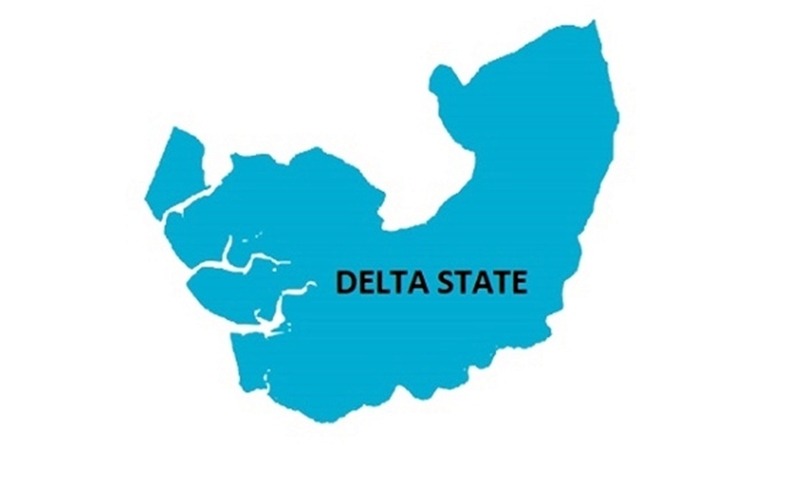
The Nigeria Police has condemned the assault on two yet-to-be-identified students of the Delta State University of Science and Technology, Ozoro, by some unidentified men suspected to be police officers.
This follows a viral video on X (formerly Twitter) which generated several reactions from police operatives.
The video, posted by an X user with the handle, ‘Ughellivibes’, on Monday, showed two scenes where some young men were being beaten with batons by police officers as onlookers gathered.
READ ALSO: 14-year-old Boy Killed In London Sword Attack
Reacting to the incident, the Force Public Relations Officer, ACP Olumuyiwa Adejobi, condemned the act, stressing that the Force did not support any indecent and unprofessional conduct.
He, however, urged the Delta State Police Command to look into the incident and bring the perpetrators to book.
He said, “Look into this. We should be able to justify our actions always. The beating is condemned, not professional. Like I always say, the police have powers to arrest, search, enforce the law, and apply minimum force to carry out their operations, but such must be done with decorum, professionalism and proportionality. We don’t support any indecent and unprofessional conduct. No way.”
READ ALSO: LIST: Nigerian Passport Ranked Among Worst Globally
Reacting to the incident, the Delta State Police Public Relations Officer, SP Bright Edafe, demanded that members of the public provide the command with details of the victims.
Edafe wrote: “Please, whoever knows the victim should send him this number 09155570008 or any of our CRU lines.”
Efforts to contact Edafe to know more about the progress the police had made proved abortive, as several calls and texts sent to him were unanswered as of the time of filing this report.
News
DSTV Hike: Lawyer To Paste Restraining Order At MultiChoice Office
Published
5 hours agoon
May 2, 2024By
Editor
The Competition and Consumer Protection Tribunal in Abuja has ordered that its interim order, restraining MultiChoice Nigeria Limited from increasing DSTV tariff, be pasted at the firm’s “corporate headquarters or any known address of the branches of MultiChoice Nigeria Limited across Nigeria.”
The chairman of the tribunal, Saratu Shafii, who made the order dated April 29, 2024, said the document should also be MultiChoice’s known email address, social media handles and any means of communication publicly known for MultiChoice.
The interim order, restraining MultiChoice from increasing its tariff, was granted in favour of an Abuja-based lawyer, Festus Onifade, who is aggrieved by MultiChoice recent announcement to increase the tariffs on its DStv and Gotv packages effective from May 1.
In his suit, marked CCPT/OP/2/2024, Onifade listed MultiChoice Nigeria Ltd and the Federal Competition and Consumer Protection Commission as defendants.
READ ALSO: Multichoice Hikes DStv, GOtv Prices
He sought “an order of interim injunction of this honourable tribunal restraining the 1st defendant whether by themselves, her privies, assigns by whatsoever name called from going ahead with impending price increase scheduled to take effect from 1st May 2024, pending the hearing and determination of the motion on notice.
“An order restraining the 1st defendant from taking any step(s) that may negatively affect the rights of the claimant and other consumers in respect of the suit pending the hearing and determination of the Motion on Notice.”
On Monday, April 29, the tribunal issued an order stopping MultiChoice from increasing its tariffs and cost of products and services scheduled to take effect from May 1.
The three-member tribunal, presided over by Shafii, gave the order following an ex parte motion moved by Ejiro Awaritoma, counsel for the applicant.
READ ALSO: Tribunal Restrains MultiChoice From hiking DStv, Gotv Subscription Rates
The company was restrained from effecting its planned price hike pending the hearing and determination of the motion on notice filed before it.
However, upon moves by the tribunal to serve Multi-Choice, the bailiff alleged that staff at the Abuja office of the company refused to receive service of the order and other court documents.
The bailiff claimed that one of the company’s top managers at the Abuja office refused to receive the documents and instructed that the documents be sent to the Lagos office, being the headquarters.
Following the bailiff’s feedback, the tribunal issued an order of substituted service on MultiChoice pursuant to Section 48 of the Federal Competition and Consumer Protection Act, 2018; and Part N, Order 14 Rule 11(1) of the CCPT Rule, 2021.
READ ALSO: MultiChoice Turns Down Canal+ Buyout
In the certified true copy of the order of substituted service, the Shaffi-led panel directed that the ex-parte order in suit number: CCPT/OP/2/2024, be pasted at the corporate headquarters or any known address of the branches of MultiChoice Nigeria Limited across Nigeria.
She also ordered that the documents be sent to the company’s “known email address, social media handles and any means of communication publicly known for Multi-Choice and shall also be pasted in the CCPT communication outlet.”
Multi-choice had recently announced price increments across its DStv and GOtv packages effective May 1, 2024.
The pay-TV company had claimed the price hike was due to the cost of business operations in Nigeria.

[JUST IN] PICTURES: Hoodlums Clash In Lagos, Set Market On Fire

How Two Kenyan School Dropouts Made Prosthetic Arms For People With Disabilities
BREAKIN: NDIC Increases Maximum Deposit Insurance Coverage
Trending

 News5 days ago
News5 days ago‘I Can’t Breathe’ – Black Man Cries As US Police Handcuffed, Pinned Him Down Till He Dies [VIDEO]

 Politics1 day ago
Politics1 day agoWhy Candidate Who Needs Interpreter Can’t Be Edo Gov – Shaibu

 Metro4 days ago
Metro4 days agoEdo Police Arrest Suspected Cultists Who Allegedly Killed Rival In His Daughter’s Presence

 News4 days ago
News4 days agoJUST IN: Popular Gospel Singer Is Dead

 News5 days ago
News5 days agoOba Of Benin Suspends Six Officials For Posing As Palace Emissaries To Ooni Of Ife

 News5 days ago
News5 days agoUNIBEN Ex-deputy VC Is Dead

 Business2 days ago
Business2 days agoCustomers Panic As CBN Bans Opay, Palmpay, Others’ New Accounts

 News3 days ago
News3 days agoOoni: Suspended Benin Palace Functionaries Banished

 News5 days ago
News5 days agoEdo Guber: ‘Which Campaign Council’, Orbih Fumes, Rejects Inclusion

 Metro4 days ago
Metro4 days agoGunmen Assassinate Governor Aiyedatiwa’s Campaign Coordinator In Ondo
